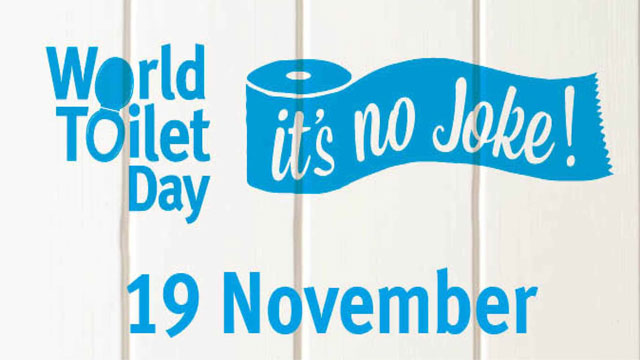
Marking November 19, 2020 with action
COMMENT | Allan Nkurunziza | On July 24th , 2013, the United Nations General Assembly unanimously voted to designate 19th November as World Toilet Day. World Toilet Day celebrates the importance of toilets in our daily hygiene and raises awareness of the close to 2.4 billion people living without access to safely managed sanitation.
A ‘safely managed sanitation service’ is a hygienic, private toilet that safely disposes of people’s waste. November 19 is about taking action to tackle the global sanitation crisis and achieve Sustainable Development Goal 6 – water and sanitation for all by 2030.
To be specific Target 6.2 aims to achieve access to adequate and equitable sanitation and hygiene for all and end open defecation, paying special attention to the needs of women and girls and those in vulnerable situation by 2030 while target 6B looks to support and strengthen the participation of local communities in improving water and sanitation management
Focus on climate change
This year the World Toilet Day 2020 focuses on sustainable sanitation and climate change. Flood, drought and rising sea levels are threatening sanitation systems – from containment to transportation to treatment to reuse and recycling. Everyone must have sustainable sanitation, alongside clean water and hand-washing facilities, to help protect and maintain our health security and stop the spread of deadly infectious diseases such as COVID-19, cholera and typhoid.
Each day nearly 1000 children die from preventable water and sanitation related diarrheal diseases, which can be stopped.
Sustainable sanitation systems also reuse waste to safely boost agriculture, and reduce and capture emissions for greener energy a contribution to achievement of SDG 13-Combating Climate change and its impacts.
So, what does a sustainable sanitation system look like?
Sustainable sanitation begins with a toilet that effectively captures human waste in a safe, accessible and dignified setting. The waste then gets stored in a tank, which can be emptied later by a collection service, or transported away by pipework.
The next stage is treatment and safe disposal. Safe reuse of human waste helps save water, reduces and captures greenhouse gas emissions for energy production, and can provide agriculture with a reliable source of water and nutrients.
COVID-19 fight reinforces sanitation message
The COVID-19 pandemic has demonstrated the critical importance of sanitation, hygiene and adequate access to clean water for preventing and containing diseases. According to the World Health Organization, hand-washing is one of the most effective actions you can take to reduce the spread of pathogens and prevent infections, including the COVID-19 virus.
Substantial progress has been made in increasing access to clean drinking water and sanitation but billions of people, mostly in rural areas, still lack these basic services. Worldwide, one in three people do not have access to safe drinking water, two out of five people do not have a basic hand-washing facility with soap and water, and more than 673 million people still practice open defecation. There is therefore more to be done to achieve sanitation for all by the year 2030.
It is also important to remind ourselves that poor sanitation is not only responsible for high mortality rates of especially children under five but also robs us of valuable man hours during the battle with these sicknesses crippling our productivity and thus reduced GDP.
Poor sanitation is also responsible for environmental pollution, water pollution through eutrophication of fresh waters say, and thus adverse effects on aquatic life. Poor menstrual hygiene due to lack of appropriate facilities in schools has also been identified as a contributor to school drop out for the girl child.
KCCA’s focus
As KCCA, we are focusing on toilet emptying for the celebrations of world toilet day this year 2020 as a way to promote safe feacal sludge management in our city and beyond.
Toilet coverage in Uganda is estimated at 79% on average, and as low as 36.3% for urban areas. Kampala is facing many challenges because of rapid urbanization which is at 5%, low coverage of sewer network at 10% and pity emptying services being largely unaffordable by the urban poor in the informal settlements.
It is further estimated that more than half of the feacal waste generated in Kampala remains untreated and is unsafely reused or disposed of to the environment.
Kampala’s toilet situation
Toilets can be classified as wet and dry. Wet toilets involve use of water such as pour flush toilets, cistern flush toilets while dry toilets involve limited or no use of water such as ventilated improved pit latrines and traditional latrines. KCCA is mandated to ensure proper on-site sanitation across the city. This involves safe containment, transportation, treatment, reuse and or recycling.
KCCA with its partners has strategically prioritized to achieve sanitation for all through its city-wide inclusive approach. This approach anchored on six main strategies. These include;
- Creating an enabling environment. This focusses on governance, strengthening policy and legal frame works, creating planning frame works and also enforcement of the set standards.
- Sanitation infrastructure development. Here KCCA focusses on achieving proper sanitation at a household level, in schools and in public places.
- Private sector led service delivery. With an enabling environment, entrepreneurs should be able to invest in sanitation as a business and thus delivering services to the communities.
- Social and sanitation marketing. This involves sensitization of communities on why sanitation is important and how best we can achieve hygiene in our homes and communities. It is a behavioral change campaign
- Focusing on gender requirements such as bins, breastfeeding and diaper changing rooms in public toilets as well as involvement of women in sanitation as a business.
- Monitoring frame work.
Over the past four years, tremendous progress has been made under this approach. Some the achievements include but not limited to an Increase in Feacal sludge collection from 54% in 2015 to 61% in 2019, increase in solid waste collection from 35% in 2016 to 50% in 2019.
KCCA has seen the establishment of CWIS steering committee and the CWIS technical committee that coordinate the different stakeholders contributing to the improvement of sanitation in the city, popularizing the KCCA Sewerage and FSM Ordinance which focuses on streamlining roles, increasing sewer connections, promotion of minimum standards and regulation of service
Popularizing of Guidelines for Occupational Health and Safety to ensure increased compliance to occupational health and safety, 25 of 45 non-complaint landlords served with nuisance notices change their behaviors.
KCCA has on a monthly basis provided 94 mobile phones for FSM tracking and more 150 PPE distributed with Monthly Mobile Data- 2GB to private emptiers for proper information tracking and collection as well as promoting the private sector in sanitation as a business.
A policy was developed, guidelines established and Standard Operating Procedures put in place for the private sector deliver sanitation services to the communities.
Pit Emptying operators have been trained, Increased or Improved livelihood opportunities as Entrepreneurs report increase in monthly income.
Community engagements and sensitization through Community meetings / Barazas, monthly community Clean-ups, Door to door campaigns, Schools cleaning campaigns and Leadership forums.
Currently three feacal sludge around Kampala can categorized into three, liquid, semisolid and thick/solid sludge. The first two can be efficiently emptied using cesspool vacuum trucks but the thick sludge is a challenge. This is why gulper technologies for toilet emptying become a critical aspect to promote safe feacal sludge management.
Achievement of SDG 6 is a multi-sectoral and not a one man show, we would like in this vain to recognize the contribution of NGOs and other partners such as AMREF, water Aid Uganda, GIZ, water for people, UNICEF, BMGF, MWE, USAID in the support of documentation of KCCA ordinance, KCCA onsite minimum standards, Public Heath act, studies and researches that result in establishment of platforms such as Uganda Parliamentary forum on water sanitation and hygiene that guide in policy formulation oversight and appropriation of funds.
WASH Forum is an umbrella that provides a mechanism through which Uganda can strengthen linkages between the parliament, different sectors, local Government, the local community, and civil society on WASH related issues and challenges in the country. This can be achieved through advocacy for better sector regulations, legislation, budget / resource allocation, coordination, research and oversight of the sector deliberations in regard to WASH.
Our targets under the KCCA five-year strategic direction for sanitation and environment, 2025 are
- Continued sensitization campaigns such as monthly weyonje clean ups
- Construction of 200 public toilets spread across the city
- Increase safely managed fecal sludge from 60% to 80% by 2025 through; Infrastructure development; Organized and regulated private sector led sanitation services; Promotion, regulation and enforcement of safely managed household sanitation; Ensuring equity, efficiency and quality service delivery along the value chain; Promote resource recovery and Eliminate open defecation.
*****
Allan Nkurunziza is the project manager the City Wide Inclusive Sanitation (CWIS) programme under KCCA
 The Independent Uganda: You get the Truth we Pay the Price
The Independent Uganda: You get the Truth we Pay the Price


